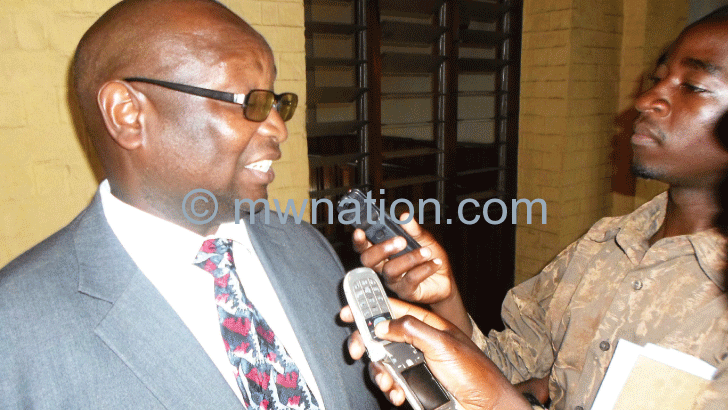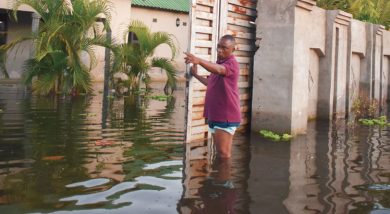Economy robbed k442bn in 10 years
Malawi has lost about $650 million (about K442.1 billion) in a decade to Illicit Financial Flow (IFF), according to a report by Global Financial Integrity (GFI)—a Washington DC-based research and advisory organisation.
The report, released on December 8 last year, says Malawi is ranked among the world’s top 100 countries in IFF at position 81 while China leads the pack at $1.39 trillion.
The December 2015 Illicit Financial Flows from Developing Countries: 2004-2013 report tabulates that in 2013 Malawi lost about $64 million while in 2004, $160 million flowed out illicitly.

in implementing laws
In an interview yesterday, private practice lawyer Jai Banda, an expert in anti-money laundering laws, attributed the situation to the snail’s pace in putting measures to curtail IFFs.
He said: “The problem in Malawi is that government takes too long to put measures in place. We are conservative. Some of us started talking about putting an anti-money laundering law in 2000. At that time, government did nothing about it. It was only in 2006 that we incorporated the law.”
Banda said there is need to bring together all stakeholders to enhance capacity by, among others, sharing of information to curtail IFFs.
He also called for intensive sensitisation and public awareness on the evils of IFF.
However, Financial Intelligence Unit (FIU) spokesperson Masauko Ebere said the country is making strides in curtailing IFF as, since 2013, it has been reviewing the Money Laundering, Proceeds of Serious Crime and Terrorist Financing Act to make it compliant with the Financial Action Task Force (FATF) recommendations.

He said the draft amendments were submitted to the Ministry of Justice and Constitutional Affairs for vetting and further drafting and that the process has been spearheaded by the Ministry of Finance, Economic Planning and Development, the FIU and Reserve Bank of Malawi.
Said Ebere: “It is our hope that the amended Act will be passed by March 2016.”
According to the report, fraudulent invoicing of trade transactions was revealed to be the largest component of illicit financial flows from developing countries, accounting for 83.4 percent of all illicit flows.
Malawi lost $597 million in dubious trade invoicing and $59 million to leakages from balance of payments.
The funds lost in a decade represent 50 percent of the 2015/16 National Budget of K 901.1 billion which has allocated K77.4 billion to the struggling Ministry of Health.
The survey finds that from 2004 to 2013, developing countries lost $7.8 trillion to illicit outflows.
Reads the report: “As a percentage of GDP, sub-Saharan Africa suffered the biggest loss of illicit capital. Illicit outflows from the region averaged 6.1 percent of GDP annually. Globally, illicit financial outflows averaged four percent of GDP.”
It says the $1.1 trillion that flowed illicitly out of developing countries in 2013 was greater than the combined total of foreign direct investment (FDI) and net official development assistance (ODA), which these economies received that year.
Commenting on dubious international trade invoicing, Ebere said the unit has recorded many trade-based money laundering cases since it started its operations.
He said most of the cases border on misrepresentation of exports, transfer pricing, under-invoicing of imports to evade tax or over-invoicing of imports to externalise foreign exchange.
On the other hand, Malawi Economic Justice Network (Mejn) executive director Dalitso Kubalasa said the country lacks capacity to curtail IFF reflected, among others, at lack of accurate data and up-to-date information, inadequate understanding of the various mechanisms used, and the absent or ineffective legislative, regulatory and institutional frameworks of redress.
“Malawi, just like most African countries, does not have enough highly trained lawyers, accountants and tax experts to carry out the oversight functions expected to actually help effectively prevent or punish perpetrators of illicit financial outflows. The few that exist are often overworked or unable to prepare sufficiently to take on the top-class professionals representing large corporations,” he said.
Kubalasa said there is need to realise that IFFs are already a huge tragedy to the country’s development aspirations and economic freedoms, saying it, therefore, needs to urgently move towards realistically strengthening domestic resource mobilisation (DRM) in its entirety.
He said: “MRA [Malawi Revenue Authority] continues to be under pressure to meet its revenue targets due to IFFs. Government, therefore, should do all it can to operationalise the anti-money laundering act besides proactively building the capital markets and responsive customer-friendly financial institutions and reverse these debilitating IFFs.”
In May 2015, our sister newspaper, Weekend Nation, reported that fiscal agencies were invetigating about 14 firms suspected of illegally externalising about K10 billion from Malawi from 2012.
The report said FIU, Reserve Bank of Malawi (RBM), MRA and the Anti-Corruption Bureau (ACB) were in the joint operation whose culprits were mostly companies owned by businesspersons of Asian origin. The scheme involved use of fake MRA documents, counterfeit invoices and shell firms allegedly under the guise of importing goods to wire money out of the foreign-currency strapped economy. n





